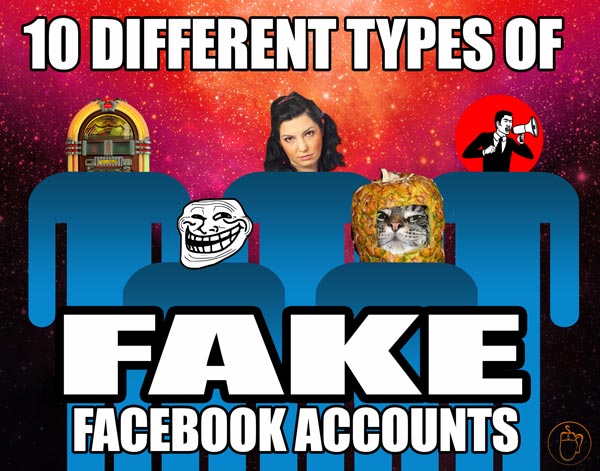Fake Facebook Accounts are accounts people establish that aren’t representative of them as a real person. Facebook intends for all of its users to practice some sincerity when identifying themselves. They want to know about the “real you” and not have you use their platform for reasons outside what it’s intended for. Contrary to what Facebook asks people to do, many people use Facebook through accounts that aren’t representative of their true identity; for many reasons people create “Fake Facebook Accounts.” This article explains some of the reasons why fake accounts are being used and why Facebook does or doesn’t tolerate them in practice.
NOTE: The author of this article in no way recommends anyone using Facebook outside the EULA. Fake Facebook Accounts are outside the EULA and use of them can be costly.
Here are the Ten Types of Fake Facebook Accounts:
Ten Types of Fake Facebook Accounts:
- Spambots
Certain accounts are established with the purpose of spamming Facebook Groups with ads. The links on their Profile usually give them away. They promote certain things for sale; usually the same thing over and over. These accounts typically have no Friends, but if they do they are other bots. If you see an account that looks like a spambot it could be a real person who is simply using Facebook for business purposes. Interacting with them is the best way to determine if this kind of account is real or not. Spambots will rarely answer back or engage with actual users. - Likebots
These are the types of accounts I have talked about before. They exist mainly just to Like things. They’ll Like Pages, and sometimes Posts too. Often their Likes can be purchased, other times they’re part of a more restricted pool of bots promoting brands or celebrities. These accounts infrequently post but Like a wide number of disconnected things. Clicking on Like Ads is one thing that these bots do, which makes they very annoying. Using advanced targeting is the way to avoid them from clicking on your ads. - Stalkers
Facebook has a feature that lets one user Block another user, making the two invisible to one another. They can’t see each other’s Posts or Comments, even if they have shared Friends. What happens when an ex-spouse or ex-boyfriend/ex-girlfriend wants spy on their ex, but can’t because they’re blocked? They set up fake accounts to spy, a.k.a “stalk”, their ex. These Stalker Profiles rarely make trouble or interact outside what they’re intended for, stalking a single individual or their Friends. Sometimes if the stalker gets bored with the stalkee, the account may evolve into a troll account to let off the hormonal steam. - Pseudonym Accounts
These aren’t really fake profiles, but rather a real person who isn’t working too hard to conceal their identity except by operating under a different name. These accounts are often established for the purpose of not being searchable on Facebook for professional reasons. If you use Facebook Groups you’ll sometimes find one or two screaming children who get upset about people interacting under false names. Although these types of accounts get reported often because of this type of behavior, Facebook doesn’t do much to enforce its users using their real names.
Unlike most other social media publications, Facebook is really diligent and effective at getting their users to validate their accounts. If a user passes the bar of linking one either their mobile number or a credit card number to their Facebook account, the account is validated and the use of a pseudonym is tolerated. - Work Branded Profiles
These are accounts that aren’t really fake per-se, but since they don’t represent someone’s real name they violate the technical definition of real: using your actual, unaltered name. Profiles like this are usually established for innocent reasons. They have names like “Anthony’s Fifth Avenue Pizza Parlor” or “Rosanna What’s Her Face: Identity Verification Engineer“. Facebook doesn’t care much that people do this. It might actually be beneficial for marketing reasons if you don’t mind looking a little unusual, so I won’t advise against it. - Shared Page Management Accounts & Ad Buying Accounts
These are generally innocuous accounts established by corporate marketers, using an email address at a corporate domain. This is mainly for the purpose of keeping the control of a Facebook Page separate from individual accounts. Lots of businesses have gotten burned by letting employees or vendors use their own accounts for managing Facebook Pages. The marketing department would wake up to find that a disgruntled employee, intending to be on the way out, had taken sole possession of all their hard-earned Facebook Pages. Sometimes it’s out of spite. Other times it’s for financial gain, digital blackmail. Facebook has improved their security model to help prevent this, but many marketing departments err on the side of caution still. Sometimes these accounts can be leveraged for media buying, advertising, and engagement on the page level as well as simply holding on to the page adminship. Many marketers set up these kinds of account for their clients when they need to buy ads on behalf of their clients, but don’t want to use their own personal Profile or ask the client for use of the client’s personal Profile. Facebook obviously wants to make it as easy as possible for advertisers to use their ad real estate, so this isn’t the kind of Fake Profile they’re looking to root out. - Trolls
These are people who are out for some lulz and enjoy engaging on many different levels from friendly to satirical to abusive. Although many of them are plainly sadistic, others are truly humorous and add value to Facebook in a way that’s impossible without anonymity. Trolls will often make their Profile identity purposefully extreme to incite RAGE, but the people they often like to tease the most are people whose views are in line with theirs. Trolls engage a lot in Facebook Groups, or by commenting on posts made by Facebook Pages. - Kids’ Accounts
Kids under 13 aren’t supposed to have Facebook accounts. Many children, however, do have cellphones to validate Facebook Profiles against. This means lots of kids who aren’t old enough to be using Facebook are intentionally making themselves look like adults. It’s pretty clear from looking at their Friends and the nature of their Posts that they’re children. I strongly advise parents to monitor each and every social media account their children are engaging with, and let them know you’re monitoring it. Kids are kids and will do stupid stuff. It will stay with them for their entire lives, and just because dots aren’t connected today with regards to social profile ownership, doesn’t mean that they won’t be connected in the future. Make sure your kids stay off social media without your supervision. - Anonymous Social Activists
Some people have social agendas that they want to enforce via all sorts of media, social media included. It’s common for people with extreme views to hide behind anonymity. This has been true for authors who operated under pen names in the past, and is even more true for social media users today. - Impersonators
The most heinous of Fake Facebook Profiles is an impersonator. These are people who are intentionally using another person’s name to trick other people into believing that they’re that person. Some trolls might find joy in creating chaos that gets attributed to their target, but it can also be part of identity theft. If you find someone operating an account that’s intended to look like you then they should be reported right away. Get ready to validate who you are in the case where the other person contests your report.
Hopefully this article illustrated that there are many different reasons why people use Fake Facebook Accounts. Some are innocent, others have duplicitous intent. Know the difference before you get freaked out on social media and make yourself look foolish by expecting people to use it the same way you do. At the end of the day remember that Facebook is trying to give everyone the best experience possible, and how that plays out in the real world might be different than what YOU expect.















I have perps on me they tell me that theres a foney fb page I need this talken down.